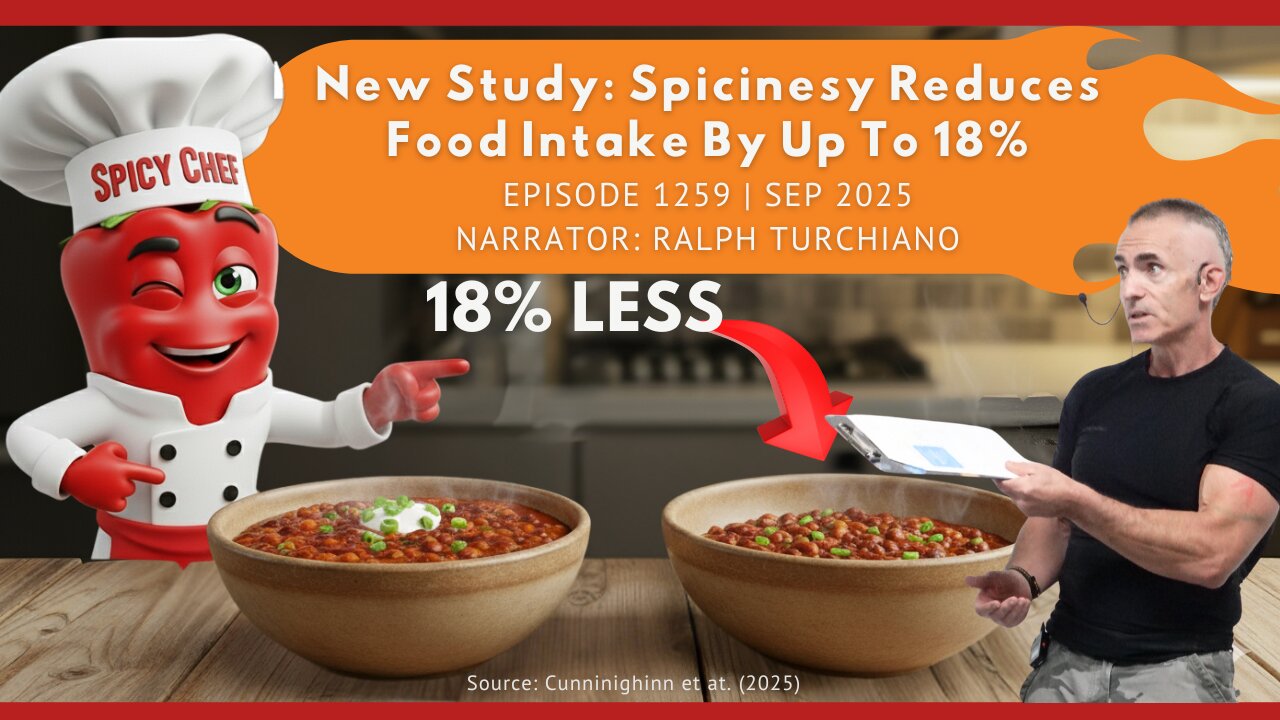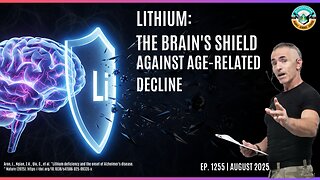Premium Only Content

New Study: Spiciness Reduces Food Intake By Up To 18%
A new study in the journal Food Quality and Preference investigated if increasing the spiciness of a meal could influence eating behaviors and reduce how much food people consume. In a series of experiments, researchers had adults eat either a mild or a spicy version of beef chili or chicken tikka masala in a lab setting. The results were significant: when participants ate the spicy beef chili, they consumed 11% less food (about 46 grams) and ate 11% more slowly compared to when they ate the mild version. A similar outcome was observed with a reformulated chicken tikka masala, where the spicy version led to an 18% reduction in food intake (about 64 grams) and a 17% slower eating rate. Interestingly, this reduction in consumption was not because participants liked the spicy food less or drank more water. The findings suggest that the “oral burn” from capsaicin—the active component in chili peppers—directly leads to slower eating and bite rates, which in turn reduces overall food and energy intake.
Disclaimers
This information is for educational purposes only and should not be interpreted as medical advice.
The study discussed was conducted on adults in a controlled laboratory setting. These findings may not apply to different populations or real-world dining situations.
Always consult with a qualified healthcare professional before making any changes to your diet, supplement regimen, or treatment plan, especially if you have a medical condition or are taking medications.
#Capsaicin #EatingRate #FoodIntake #Satiation #Paprika
Cunningham, P. M., Smith, I. M., & Hayes, J. E. (2025). Increasing the spiciness of a lunch meal influences oral processing behaviors and decreases food and energy intake. Food Quality and Preference, 131, 105566.
Capsaicin, paprika, oral burn, spice, chili pepper, eating rate, food intake, energy intake, oral processing, satiation, satiety, ad libitum intake, beef chili, chicken tikka masala, eating behavior, weight management, food formulation, paprika, non-textural manipulation, bite rate, meal duration, food pleasure, calorie reduction, appetite, human study, crossover design
-
 7:07
7:07
Nutrition Company
1 month ago $0.02 earnedLithium: The Brain's Shield Against Age-Related Decline? Ep. 1255 August 2025
614 -
 LIVE
LIVE
LFA TV
1 day agoBREAKING NEWS ALL DAY! | THURSDAY 9/25/25
823 watching -
 9:21
9:21
Tundra Tactical
2 hours ago $0.31 earnedThe Dumbest Gun Questions Of All Time Answered! Part 2
4.55K2 -
 1:03:58
1:03:58
TheCrucible
4 hours agoThe Extravaganza! EP: 43 (9/25/25)
104K11 -
 1:14:53
1:14:53
Kim Iversen
5 hours agoHegseth Summons Top Brass — Is War With Russia Incoming?
48.2K132 -
 5:50:58
5:50:58
StoneMountain64
6 hours agoBattlefield 6 News and Extraction Gaming
56.6K -
 LIVE
LIVE
LumpyPotatoX2
1 hour agoWorld of Tanks 2.0 | Public Service Announcement - #RumbleGaming
49 watching -
 LIVE
LIVE
GritsGG
5 hours agoQuad Win Streaks w/ Bobby Poff!🫡 Most Wins in WORLD! 3600+
20 watching -
 LIVE
LIVE
Badlands Media
12 hours agoQuite Frankly Ep. 23
604 watching -
 1:31:41
1:31:41
Redacted News
4 hours agoNew Charlie Kirk Video Evidence Could Change EVERYTHING | Redacted w Natali & Clayton Morris
191K248